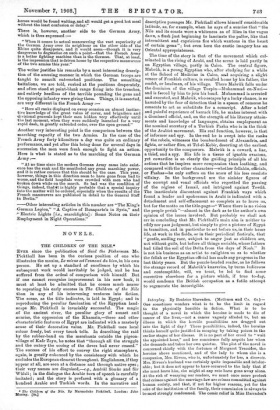NOVELS.
THE CHILDREN OF THE NILE.*
-Even since the publication of Said the Fisherman Mr. 'Picktball has been in the curious position of one who illustrates the maxim, Le miens est rennemi du bien, in his own 'person. He set up a standard of excellence by which his subsequent work would inevitably be judged, and he has suffered from the ordeal of comparison with himself. But. if one cannot recognise improvement in his new book, it must at least bo admitted that he comes much nearer to repeating his early success in The Children of the Nile than in any of his intervening ventures into fiction. The scene, as the title indicates, is laid in Egypt ; and in reproducing the peculiar fascination of the Egyptian land- scape Mr. Picktball is invariably successful. The magic .of the ancient river, the peculiar glory of sunset and .sunrise, the oppression of the Khamsin,—these and other characteristic features of Egypt are indicated with a masterly ,sense of their decorative value. Mr. Pickthall uses local Colour freely, but every touch tells. In describing the raid by the robber-band on the merchants outside the pigeon- village of Kafr Zeyn, he notes that "through all the struggle and the outcry the cooing of the doves had never ceased." The success of his effort to convey the right atmosphere, again, is greatly enhanced by the consistency with which he excludes the European element throughout. Englishmen, if they appear at all, are seen at a distance and through native eyes ; their very names are disguised,—e.g., Amiral Simfir and Sir
; in the dialogue the Arabic turn of speech is carefully imitated ; and the story is prefaced with a glossary of a hundred Arabic and Turkish words. In the narrative and
* The Children of as Nile. By Marmad uke PickthalL London: John Murray. [6s.]
descriptive passages Mr. Piokthall allows himself considerable latitude, as, for example, when he says of a sunrise that " the Nile and its coasts wore a whiteness as of lilies in the vague dawn, a flush just beginning to lancinate the pallor, like that intermittent and capricious fire which wantons in the heart of certain gems "; but even here the exotic imagery has an Oriental appropriateness.
The time of the story is that of the movement which cul- minated in the rising of Arabi, and the scene is laid partly in an Egyptian village, partly in Cairo. The central figure, Mehra, is a young Egyptian who, after studying for a while at the School of Medicine in Cairo, and acquiring a slight veneer of Frankish culture, is recalled home by his father, the omdeh, or headman, of his village. There Mabritk falls under the dominion of the village Turpin—Muhammad en-Nuri-- and is forced by him to join his band. Muhammad is arrested and executed, and Mabrfik, who escapes by a lucky chance, is so haunted by the fear of detection that in a spasm of remorse he consents to act as substitute for a conscript. After a brief and painful experience of barrack life, he makes interest with a dismissed official, and, on the strength of his literary attain- ments and knowledge of languages, obtains employment as the nominal secretary of a Turkish Pasha who is in the thick of the Arabist movement. His real function, however, is that of informer and spy. In the end he is swept into the ranks of the rebels, witnesses the bombardment of Alexandria, and fights, or rather flies, at Tel-el-Kebir, deserting at the earliest opportunity to the conquerors. Mabralc is a coward, a liar, a thief, and a spy. His life is a tissue of ignoble evasions, yet cowardice is so clearly the guiding principle of all his actions that he inspires more compassion than loathing, and compared with the other characters—whether fellahtn, officials, or Pashas—he only suffers on the score of his less resolute villainy. In the background are the sinister figures df the corrupt and venal officials who regretted the passing of the regime of Ismail, and intrigued against Tewfik.
The inarticulate discontent against Frankish ways which found a leader and spokesman in Arabi is indicated with a detachment and self-effacement so complete as to leave us, but for the motto on the title-page—" Where there is no vision the people perish "—almost in the dark as to the author's own opinion of the issues involved. But probably we shall not err in concluding that Mr. Pickthall's main aim is neither to edify nor pass judgment, but simply to give a picture of Egypt in transition, and in particular to set before us, in their home life, at work in the fields, or in their periodical festivals, that " gentle, smiling race, subject to anger just as children are, not without guile, but before all things sociable, whose fathers had tilled the soil of the Delta from the days of Noah." It is not his business as an artist to enlighten us as to whether the fellah or the Egyptian official has made any progress in the last thirty years. But the puzzle-headed reader, as he follows the strange record of Mabrak's knaveries, by turns ludicrous and contemptible, will, we trust, be led to find some corrective elsewhere for a picture which, if true to-day, would condemn the British occupation as a futile attempt to regenerate the incorrigible.




























































 Previous page
Previous page